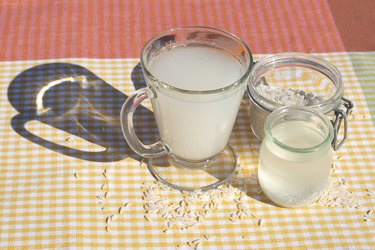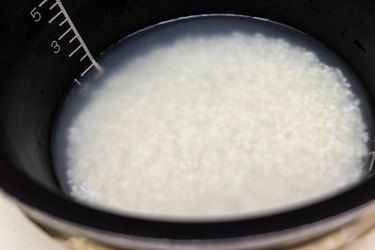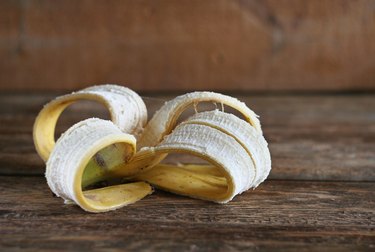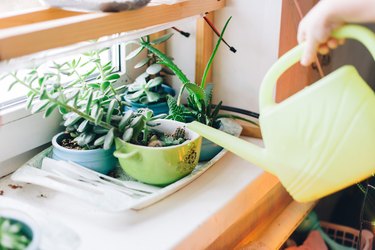
If you're a plant parent, you likely know that fertilizer is an important piece of plant care. But did you know you can make natural fertilizers from everyday kitchen waste? Rice water is a great example of this. After washing rice in preparation to cooking it, you can pour room-temperature water on your plants instead of down the drain. This water includes starch and other nutrients that will benefit your plant.
To learn more about why this works and other intriguing and unusual plant fertilizers, we talked to Denver-based houseplant consultant and expert Tyler Cross, aka @thatplantguy_ty on Instagram.
Video of the Day
Video of the Day

What’s the benefit of using rice water and other fertilizers?
Rice water has been used to stimulate everything from hair growth to plant growth. And by all accounts, it's been used for a very long time. In fact, it's believed that people started using rice water as fertilizer centuries ago in China.

"Someone along the way likely recognized that the minerals in rice are the same minerals that are good for plants, and the starch promotes beneficial bacteria growth," Cross says. "I myself first heard about the planting-growing strategy from a plant mentor of mine who was looking for ways to save money that were also sustainable. I tried rice water and never looked back!"
So why is rice water good for plants, and what are the real benefits of using rice water? It all comes down to what's actually left behind in the excess water, says Cross. Rice water, and other natural fertilizers like pasta water, contain essential nutrients and, in some cases, healthy bacteria that boost plant growth and benefit plant roots. And it's certainly cost-effective.
"Plants need fertilizer just as humans need vitamins," Cross says. "Rice water and pasta water, basically starchy waters, help create good bacteria in the soil, which helps the organic material break down, distributing nutrients to the roots. I love using rice and pasta water. I save it every time I cook with it."
Tip
Wondering what natural fertilizer is exactly? Natural fertilizer (or organic fertilizer) refers to any plant food that is—you guessed it—derived from nature. This includes anything that is or was once living on earth, from animals to minerals to plant matter. This differs from synthetic fertilizers, which are made from chemicals like sulfur and nitrogen.
You can use any uncooked rice grain to make fermented rice water fertilizer, including white and brown rice. While any rice water will have the same effect, Cross opts for varieties like jasmine, basmati and traditional white rice because he cooks with these types most often. Regardless of which rice variety you use, Cross has one recommendation: "The starchier, the better."
As far as plants to use it on, rice water is best for almost all indoor plants, Cross says. "Succulents and cacti tend to do better when misted with it rather than directly watered, but other than that, you can use it on all plants."
That said, go easy on the stuff! "The starch promotes bacteria growth, and while most of the bacteria are good for the soil, some can eventually harm your roots," Cross points out. "I recommend using rice water no more than once a month."
But wait! There are other natural fertilizers to consider too…
If you're not a big fan of cooking rice or pasta, have no fear. Rice water and pasta water aren't the only organic fertilizers you can easily create in your kitchen. You can also soak a number of common ingredients in water and then use the resulting nutrient-rich liquid on your plants. For example, some popular plant fertilizers include eggshell water, potato water, onion peel water and banana peel water.

"I love banana water the most," says Cross of the fertilizer, which is created by soaking banana peels in water. "Plants need NPK (nitrogen, phosphorus and potassium) to thrive. And banana water provides so much potassium. Plants, especially ficus, love it."
Cross also likes to use eggshell tea—i.e., tea made from steeping eggshells in boiling water—on his plants. "My succulents and plants with rhizomes [a specific type of plant stem] love eggshell tea," he says. "The calcium in it helps build strength."
So how do you actually use rice water and other natural fertilizers?
Our handy guide below, expert-approved by Cross, lets you start experimenting with rice water, pasta water and other organic fertilizers. You can try adding them to your plants by misting the leaves with a spray bottle or by bottom watering or top watering.
Mini Guide to Natural Fertilizers
- Rice water: Rinse any type of rice as you usually would by submerging the rice in water and running your hands through the mixture a few times. Let sit for about 30 minutes. Then strain the rice through a fine mesh strainer, saving the excess water and adding it to a watering can. The water should have a milky white look to it.
- Pasta water: Simply reserve the water that is left over after cooking any type of pasta. Let cool completely and then mix it with fresh, cool tap water. This will add starch to your plant's soil, much as rice water does. However, do this only if you did not add salt to your pasta water!
- Eggshell tea: Reserve the shells of any eggs you use for cooking (at least six eggs) and add them to a pot of boiling water. Turn off the heat and let the eggshells steep in the covered pot. Let this water cool and sit overnight. Be sure to strain the eggshells out of the water before pouring the eggshell tea on your plants. The tea will add potassium and calcium to your plant's soil.
- Banana water: Add a few banana peels to a mason jar filled with water, close the lid and let sit overnight in the fridge. Then strain the contents and transfer the banana water to a watering can. This will add potassium to your plant's soil.
- Potato water: Reserve any leftover water after boiling russet potatoes. (But again, only if you didn't add salt!) All you need to do is strain the water, let it cool and add it to your watering can. The water will add starch and vitamins to your plant's soil.
What plants can benefit from rice water and other natural fertilizers?
When fertilizing a plant, it is important to understand the specific needs of your plant. "Different plants absolutely require different types of fertilizer," Cross said. "The basic nutrients all plants need are nitrogen, phosphorus and potassium. But in order for them to reach their potential, you need to tailor things."

So what natural fertilizer can you use on different house and garden plants? Allow us to break it down with Cross's expertise below.
Best plants for rice water or pasta water: All plants will benefit from this on occasion, but don't use rice or pasta water more than once a month.
Best plants for banana water: Ficus, monstera, philodendron and most other tropicals will appreciate banana water, Cross says.
Best plants for eggshell water or "eggshell tea": Succulents, cacti, snake plants and ZZ plants.
A word to the wise…
Keep in mind that as much as we love natural fertilizers like rice water, they aren't exactly magic potions. Though they should definitely be on your plant-care team, think of them as one player among many.
"Natural fertilizers are different from store-bought in that they usually target only one of the many nutrients our plants need," Cross said. "Store-bought fertilizers often have many nutrients and should be used on occasion as well."
So the next time you pull some rice out of your pantry for dinner, be sure to feed your houseplants too!